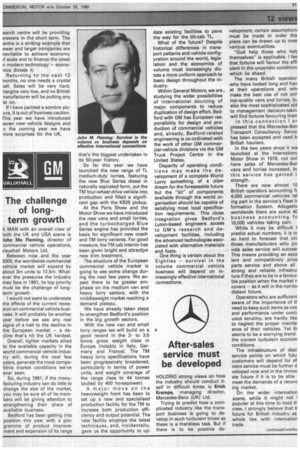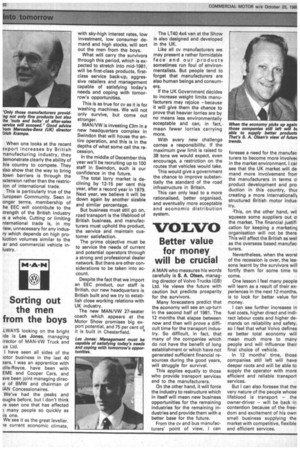After-sales service must be developed
Page 93

Page 94

If you've noticed an error in this article please click here to report it so we can fix it.
HOLDING strong views on how the industry should conduct itself in difficult times is Erich Krampe, managing director, Mercedes-Benz (UK) Ltd.
Trying to predict how a complicated industry like the transport business is going to develop in such turbulent times as these is a thankless task. But if there is to be positive de
velopment, certain assumptiom must be made in order tha plans can be drawn up to rnee various eventualities.
"God help those who helj themselves" is applicable. I fee that fortune will favour the effi cient in the uncertain condition which lie ahead.
The many British operator: who have looked long and har( at their operations and wh( make the best use of not onl. top-quality vans and lorries, bL also the most sophisticated aid to management decision-takin will find fortune favouring then In this connection I ar pleased that the Mercedes-Ben Transport Consultancy Servic has been accepted and used b British hauliers.
In the two years since it wa launched at the Internationi Motor Show in 1978, not onl have sales of Mercedes-Ben vans and lorries increased, bL this service has gained i strength.
There are now almost 10 British operators accounting fc 4,000 commercial vehicles tal img part in the service's Fleet Ir formation System. Altogethc worldwide there are some 40 business accounting fc 10,000 vehicles taking part.
While it may be difficult t predict actual numbers, it is n< so hard to forecast that onl those manufacturers who pr< vide sales service will succeel This means providing an exce lent and competitively price parts service and above all strong and reliable infrastru, ture if they are to be in a favouri ble position when the market n covers — as it will in the not-tol distant future.
Operators who are sufficient aware of the importance of 0need to keep such items as cos and performance under contii uous scrutiny, are hardly like to neglect the proper maintei ance of their vehicles. Yet th seems to be a worrying trend the current turbulent econom conditions.
The infrastructure of deal. service points on which futu customers will depend for ef cient service must be further d veloped now and in the immec ate future if it is to be able meet the demands of a recov€ ing market.
On the wider internation scene, while it might not I popular at this time to hold tIr. view, I strongly believe that ti future for British industry as whole lies with internation trade. When one looks at the recent axport increases by British -nanufacturing industry, they Jemonstrate clearly the ability of :his country to compete. They ilso show that the way to bring lawn barriers is through the 3xtension rather than the restricion of international trade.
This is particularly true of the European Community. Seen in anger terms, membership of he EEC will contribute to the itrength of the British industry is a whole. Cutting or limiting nternational trade is, in my riew, unnecessary for any indusry which depends on high proluction volumes similar to the ar and commercial vehicle inlustry.
























































































































































